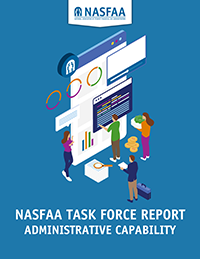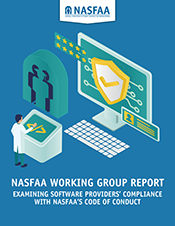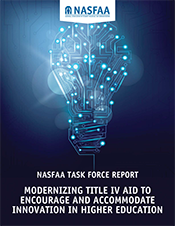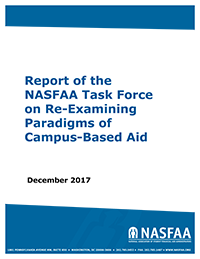Task Force Reports
NASFAA regularly convenes task forces comprised of geographically diverse groups of NASFAA member volunteers from all types of postsecondary institutions and sectors to help review legislative and policy proposals and voice NASFAA's position on pending legislation.
Our task forces have addressed a wide range of issues within NASFAA's major policy areas, including (but not limited to):
- Minimizing student indebtedness
- Supporting need-based aid programs
- Simplifying and improving consumer information, and
- Providing recommendations for the reauthorization of the Higher Education Act
At its inception, each task force outlines its guiding principles, members, and actionable goals in a charter specific to its unique task. At its conclusion, the task force summarizes its final recommendations in a report, subject to approval by NASFAA's Board of Directors, which is then disseminated widely to NASFAA members, lawmakers, administration officials, the press, and other public policy experts.
NASFAA Members - if you are interested in volunteering for an upcoming NASFAA Task Force, please visit our Volunteer Information page.
Below is a summary of recent NASFAA task force reports.
 Implicit Bias Toolkit
Implicit Bias Toolkit
NASFAA published an Implicit Bias Toolkit which aims to help financial aid offices establish a neutral basis from which to build policies and deploy procedures in the administration of financial aid. "As financial aid administrators, we have the tools at our disposal to push for a more socially just world, but we must first start by identifying and dismantling the impact of implicit bias in the financial aid process," said NASFAA President Justin Draeger in a press release. The toolkit is the culmination of exhaustive work by a task force of NASFAA members charged with identifying and reducing bias in the administration of financial aid. NASFAA members are encouraged to use this toolkit as a jumping off point to examine current processes — such as how they develop financial aid forms, communications, cost of attendance policies, scholarship policies, and more — and make changes where needed to better serve all current and prospective students. Download Toolkit (PDF)
 Administrative Capability Task Force Report
Administrative Capability Task Force Report
June 2020 - This task force convened in September 2019 to deliver a report containing recommendations that could provide better support for financial aid offices, ensuring they are able to meet administrative capability standards. In listening sessions held throughout the regions, NASFAA members consistently indicated concern regarding institutional support toward staffing and training for the compliant administration of Title IV programs and services to their respective students. The task force explored possible legislative and regulatory recommendations to gain support for institutional financial aid offices to be adequately resourced, and developed three recommendations for ways in which NASFAA can be instrumental in the improvement of administrative capability on campuses. Download report (PDF)
 Examining Software Providers' Compliance With the NASFAA Code of Conduct Report
Examining Software Providers' Compliance With the NASFAA Code of Conduct Report
May 2020 - The working group was convened in September 2019 to research and analyze the role that student financial aid management software plays in institutions' ability to provide accurate and clear aid offers. The group comprised a geographically diverse group of seven NASFAA members from all postsecondary institutional sectors, with a particular emphasis on the inclusion of members from schools that represent users of as many financial aid management systems as possible, including homegrown systems. Download Report (PDF)
 Enhanced Loan Counseling Task Force Report
Enhanced Loan Counseling Task Force Report
November 2019 - The Enhanced Loan Counseling Task Force Report was formed in early 2019 in response to growing Congressional interest in mandating annual loan counseling. The group recommended a customized counseling approach, using modules that would be offered at key points in students’ educational paths instead of a one-size-fits-all annual counseling requirement. Download Report (PDF)
 Modernizing Title IV Aid Task Force Releases Recommendations
Modernizing Title IV Aid Task Force Releases Recommendations
June 2019 - NASFAA's Board of Directors recently approved the Modernizing Title IV Aid to Encourage and Accommodate Innovation in Higher Education task force's recommendations that were developed over the spring of 2019. The group made several recommendations for changes to existing statute and regulations that would improve the financial aid delivery process for students and reduce burden on financial aid offices, while maintaining proper safeguards against fraud and abuse. The group also developed several new proposals to address unique challenges institutions and students face in the context of innovative learning models. Download Report (PDF)
 Re-Examining Paradigms of Campus-Based Aid
Re-Examining Paradigms of Campus-Based Aid
December 2017 - NASFAA's board of directors recently approved the Re-Examining Paradigms of Campus-Based Aid task force's report. The task force convened over the summer for 2017, ultimately developing two models for preserving the campus-based aid programs in a one grant/one loan environment. Download Report (PDF)
Publication Date: 8/5/2021



